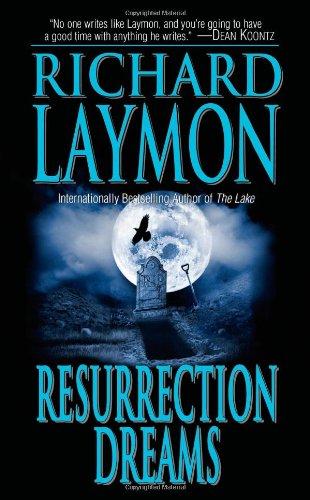 By RICHARD LAYMON (Leisure; 1989/2005)
By RICHARD LAYMON (Leisure; 1989/2005)
Not a very good book, I’m afraid, although RESURRECTION DREAMS is an enjoyable enough goof. It was, surprisingly, one of the better received novels by the late Richard Laymon, having been included among Leisure’s ‘00s mass market Laymon reprints (whereas superior Laymon books like NIGHT SHOW and MIDNIGHT’S LAIR weren’t).
This is a definite case of a writer being too smart for his material, which is ridiculous by any standard. Yet Laymon was evidently fully aware of the goofiness of his story, about a nerd named Melvin who’s obsessed with bringing dead bodies back to life. He first demonstrates this proclivity at a high school science fair, where he freaks out everyone present by attempting to resurrect a deceased cheerleader with a car battery and jumper cables.
Melvin is interred in a nuthouse for that stunt, but gets let out several years later. It’s around then that the sweet young Vicki, a classmate of Melvin’s who made the mistake of being nice to him back in the day, returns to her hometown. She still suffers from nightmares triggered by Melvin’s science project, and isn’t thrilled about coming back into contact with the source of her upset. Melvin for his part is still up to his old tricks, attempting to resurrect corpses through incantations contained in a book. He eventually hits upon a spell that works, causing a young woman to come back to life—as a ravenous sex maniac.
Opposing him is the pure-hearted Vicki, who’s constantly getting overcome by fear and breaking into crying fits. I rooted for Melvin and, even though he’s the antagonist, Laymon seems fully cognizant that Melvin is the more compelling character. Note how in the course of the story he gets almost everything he wants (notably the attentions of an alluring sexpot, even if she is undead), and how Vicki is constantly being subjected to horrific dream violations.
Prose-wise RESURRECTION DREAMS is about average by Laymon standards. It’s not badly written, but lacks the refinement and intensity of his best work. The storytelling isn’t terribly invigorating, with a narrative that despite a few quirky detours follows a predictable path. The ending, though, is something else entirely, closing things out on an unsettled and ambiguous note that belongs (and may well have originated) in a completely different story.
